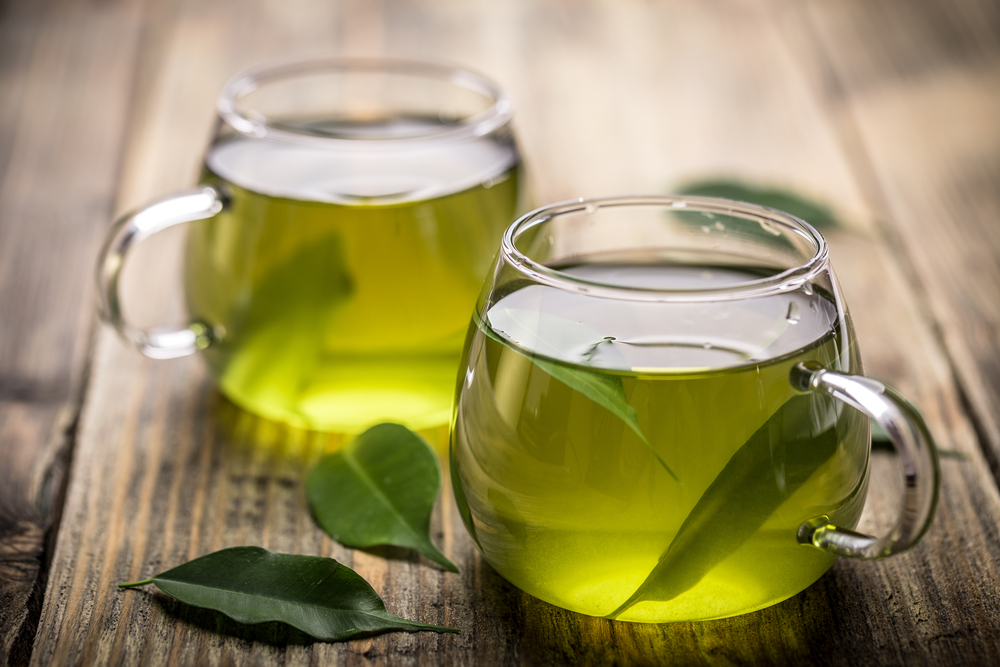Give Me Some Green Please
Second only to water, tea is the most widely consumed beverage in the world. There have been extensive studies on the health benefits of green tea. Not only is tea the perfect drink for weight loss, when you read about the other health benefits of tea, you will want to make drinking some types of tea a daily habit!
Tea is native to eastern Asia and is a member of the Theaceae family. It is an evergreen shrub or small tree with dark green, serrated-edged oval leaves. Green tea is simply leaves that have not undergone the same oxidation and withering process as black or oolong teas.
Green tea has a high concentration of polyphenols, a powerful antioxidant. It’s what makes green tea so beneficial to our health. Our cells are subjected to a lot of damage due to environmental, genetic, and dietary factors. Free radicals, or cell-damaging molecules, can result in many health problems, but green tea can help to fight off the free radicals that cause them.
Drinking green tea daily can help to lower blood sugar. Worldwide, about 400 million people have Type 2 diabetes. That number is likely rising due to stress, poor diet, and lack of exercise. However, green tea can help counteract our poor lifestyle choices and lower blood sugar.
Because green tea is an anti-inflammatory, it helps to reduce symptoms of digestive issues related to inflammation such as Inflammatory Bowel Disease (IBD), ulcerative colitis and Crohn’s disease.
Cancer, in large part, is due to oxidation of our cells, and green tea’s high concentration of antioxidants can help fight cancer.
Did you know…
- An analysis of many studies found that women who drank the most green tea had a 20-30% lower risk of developing breast cancer, the most common cancer among women.
- One study found that men who drank green tea had a 48% lower risk of developing prostate cancer, the most common cancer among men.
- An analysis of 29 studies revealed that green tea drinkers were 42% less likely to develop colorectal cancer.
- Green tea’s antioxidants may prevent cholesterol absorption in the intestines and expedite the ridding of bad cholesterol in the body. Studies have demonstrated that green tea raises good cholesterol (HDL) in humans.
- The combination of theanine and catechins, a type of antioxidant found in green tea, has been found to increase thermogenesis and decrease triglyceride levels, which promotes fat oxidation.
A specific component of green tea, L-theanine, provides a number of health benefits such as promoting relaxation and sleep and aids in weight loss by preventing fat accumulation. In fact, in an article published in the August 2011 issue of “Journal of the Science of Food and Agriculture”, L-theanine has been linked to improved weight loss and feelings of relaxation.
Clinical studies indicate that green tea boosts metabolism and assists in fat burning. Studies have shown that green tea combined with caffeine expedited weight loss in moderately overweight participants. Green tea contains a phytonutrient called epigallocatechin gallate (EGCG), which increases a hormone that promotes satiation, or a feeling of fullness. EGCG has been found to decrease the risk of developing atherosclerosis. It has strong anti-inflammatory properties and thereby decreases arterial inflammation which decreases the chances of sticky build up on the artery walls.
L-theanine, an amino acid that occurs naturally in green tea (camellia sinensis), is often used as a dietary supplement to promote relaxation, lift mood and reduce anxiety without sedation. It induces a calm state of mind by promoting alpha waves in the brain. L-theanine is one of the main psychoactive components of green tea and has been shown to generate creativity and higher learning via the ability to ignore distracting information during complex tasks.
It may help promote weight loss by calming the nervous system and prevent anxiety and stress, therefore reducing the likelihood of emotional overeating. L-theanine also increases the release of dopamine, the neurotransmitter responsible for feelings of pleasure and reward, which may also help weight loss by decreasing overeating.
According to the NYU Langone Medical Center, there are no reported safety issues associated with taking L-theanine, although it may potentially increase the side effects associated with the use of lipid-lowering medicines and some sedatives. This is one of the reasons you should always check with your health professional prior to adding supplementations.
Brewing your own green tea to drink hot or cold is simple. Put your loose leaf tea in a strainer ball and submerge into 10 ounces of water, bring to a boil, then remove from heat. Let it steep for no longer than 10 minutes as over-brewing will damage the catechins in the fragile leaves. Remove the tea leaves and add to ice or drink as is. If you refrigerate the tea, drink within 2 days of brewing.
If your goal is to boost your mood, increase your antioxidants, and decrease your likelihood of overeating, add a daily dose of L-theanine found in green tea! If your goal is to lose weight, supplementing with L-theanine, found in our weight loss supplement included in our customized weight loss plan, may be a great option for you.

